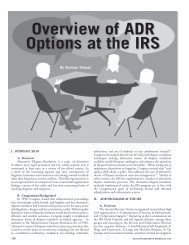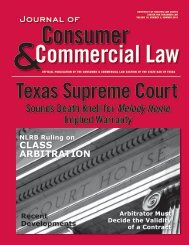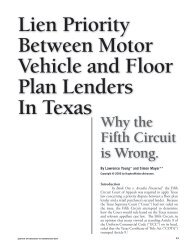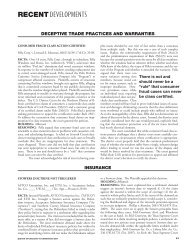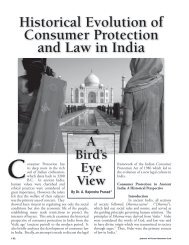Teaching Consumer Credit Law in an Evolving Australian Economy
Teaching Consumer Credit Law in an Evolving Australian Economy
Teaching Consumer Credit Law in an Evolving Australian Economy
You also want an ePaper? Increase the reach of your titles
YUMPU automatically turns print PDFs into web optimized ePapers that Google loves.
University of Houston Health <strong>Law</strong> & Policy Institute,<br />
August 2011.<br />
C.2. Who is covered? Who is a covered entity?<br />
Section 181 <strong>in</strong> the Medical Records Privacy statute, will cont<strong>in</strong>ue<br />
to def<strong>in</strong>e a “covered entity” to be <strong>an</strong>y person who:<br />
1. For commercial, f<strong>in</strong><strong>an</strong>cial, or professional ga<strong>in</strong>, monetary<br />
fees, or dues, or on a cooperative, nonprofit, or<br />
pro bono basis, engages, <strong>in</strong> whole or <strong>in</strong> part, <strong>an</strong>d with<br />
real or constructive knowledge, <strong>in</strong> the practice of assembl<strong>in</strong>g,<br />
collect<strong>in</strong>g, <strong>an</strong>alyz<strong>in</strong>g, us<strong>in</strong>g, evaluat<strong>in</strong>g, stor<strong>in</strong>g,<br />
or tr<strong>an</strong>smitt<strong>in</strong>g protected health <strong>in</strong>formation;<br />
2. Comes <strong>in</strong>to possession of protected health <strong>in</strong>formation;<br />
3. Obta<strong>in</strong>s or stores protected health <strong>in</strong>formation under<br />
the federal statute <strong>an</strong>d regulations; or<br />
4. Is <strong>an</strong> employee, agent, or contractor of one of these persons<br />
who creates, receives, obta<strong>in</strong>s, ma<strong>in</strong>ta<strong>in</strong>s, uses, or<br />
tr<strong>an</strong>smits protected health <strong>in</strong>formation. 19<br />
This <strong>in</strong>cludes a bus<strong>in</strong>ess associate, health care payer, governmental<br />
unit, <strong>in</strong>formation or computer m<strong>an</strong>agement entity, school, health<br />
researcher, health care facility, cl<strong>in</strong>ic, health care provider, or person<br />
who ma<strong>in</strong>ta<strong>in</strong>s <strong>an</strong> Internet site. 20 The Texas Medical Records<br />
Privacy statute, then, regulates <strong>an</strong>yone who comes <strong>in</strong>to possession<br />
of personal health <strong>in</strong>formation (“PHI”) or is <strong>an</strong> employee, agent,<br />
or contractor who creates, receives, obta<strong>in</strong>s, ma<strong>in</strong>ta<strong>in</strong>s, uses, or<br />
tr<strong>an</strong>smits PHI. There are exemptions <strong>in</strong> the state act for:<br />
1. Workers compensations pl<strong>an</strong>s <strong>an</strong>d self-<strong>in</strong>sured workers<br />
compensation pl<strong>an</strong>s;<br />
2. Employee benefits pl<strong>an</strong>s;<br />
3. Educational records covered by the Family Educational<br />
Rights <strong>an</strong>d Privacy Act; 21<br />
4. Non-profits who pay for <strong>in</strong>digent medical care but have<br />
no medical primary purpose;<br />
5. Processors of payment tr<strong>an</strong>sactions <strong>in</strong> f<strong>in</strong><strong>an</strong>cial <strong>in</strong>stitutions;<br />
<strong>an</strong>d<br />
6. H<strong>an</strong>dlers of crim<strong>in</strong>al offenders with mental impairments.<br />
22<br />
After the effective date of HB 300, also excluded from coverage of<br />
the Act will be those <strong>in</strong>volved with crime victim compensation. 23<br />
C.3. What activities are restricted? Disclosure, sale.<br />
C.3.1. Disclosure<br />
It is import<strong>an</strong>t to note one key provision of the Act. The<br />
Texas statute conta<strong>in</strong>s one profoundly impactful, although seem<strong>in</strong>gly<br />
<strong>in</strong>nocuous, provision. The state statute def<strong>in</strong>es the word<br />
“disclose” to me<strong>an</strong> <strong>an</strong>y action to “release, tr<strong>an</strong>sfer, provide access<br />
to, or otherwise divulge <strong>in</strong>formation outside the entity hold<strong>in</strong>g<br />
the <strong>in</strong>formation.” 24 It is critical to fully absorb the impact of<br />
this def<strong>in</strong>ition. Anyone who tr<strong>an</strong>sfers <strong>in</strong>formation, divulges <strong>in</strong>formation,<br />
or provides access to <strong>in</strong>formation must be aware of the<br />
implications for do<strong>in</strong>g so without <strong>an</strong> authorization. Taken <strong>in</strong><br />
its literal me<strong>an</strong><strong>in</strong>g, the def<strong>in</strong>ition of disclosure is so broad that it<br />
would encompass almost <strong>an</strong>y activity whereby health <strong>in</strong>formation<br />
or demographics of others is <strong>in</strong>volved. Any <strong>in</strong>formation about<br />
<strong>an</strong> <strong>in</strong>dividual’s condition, care, payment, or identity is protected<br />
from be<strong>in</strong>g divulged or be<strong>in</strong>g accessed, no matter the form <strong>in</strong><br />
which it might be ma<strong>in</strong>ta<strong>in</strong>ed. Any covered entity, <strong>in</strong>clud<strong>in</strong>g associates<br />
of a covered entity, is affected by the statute <strong>in</strong> some m<strong>an</strong>ner.<br />
Exceptions are limited <strong>an</strong>d the breadth of the statute’s reach<br />
is stagger<strong>in</strong>g.<br />
C.3.2. Sale of <strong>in</strong>formation<br />
Of even greater signific<strong>an</strong>ce is the Act’s strict b<strong>an</strong> on the sale<br />
of protected health <strong>in</strong>formation. A covered entity may not disclose<br />
<strong>an</strong> <strong>in</strong>dividual’s protected health <strong>in</strong>formation to <strong>an</strong>y other<br />
person <strong>in</strong> exch<strong>an</strong>ge for direct or <strong>in</strong>direct remuneration. 25 Exceptions<br />
only allow disclosure to <strong>an</strong>other covered entity under the<br />
statute or a covered entity under the Insur<strong>an</strong>ce Code for treatment,<br />
payment, health care operations, <strong>an</strong>d <strong>in</strong>sur<strong>an</strong>ce or certa<strong>in</strong><br />
HMO functions or as otherwise authorized or required by law. 26<br />
Further, <strong>an</strong>y charges for the disclosure for treatment, payment,<br />
health care operations, or to perform <strong>an</strong> <strong>in</strong>sur<strong>an</strong>ce function c<strong>an</strong>not<br />
exceed the covered entity’s reasonable costs <strong>in</strong> prepar<strong>in</strong>g <strong>an</strong>d<br />
tr<strong>an</strong>smitt<strong>in</strong>g the PHI. 27<br />
Because the Act restricts disclosure of health <strong>in</strong>formation for<br />
even <strong>in</strong>direct remuneration, more th<strong>an</strong> <strong>an</strong> outright b<strong>an</strong> on the sale<br />
of <strong>in</strong>formation is restricted. The Act restricts <strong>an</strong>y tr<strong>an</strong>sfer which<br />
results <strong>in</strong> even <strong>in</strong>direct f<strong>in</strong><strong>an</strong>cial ga<strong>in</strong> which is not associated with<br />
treatment, payment, operations, <strong>in</strong>sur<strong>an</strong>ce, or for compli<strong>an</strong>ce authorized<br />
by law or required by law. 28 The outright b<strong>an</strong> on disclosure<br />
for even <strong>in</strong>direct remuneration does not have <strong>an</strong>y mech<strong>an</strong>ism<br />
for allow<strong>in</strong>g for disclosure, not even after notice <strong>an</strong>d consent or<br />
authorization. Rather, the disclosure for remuneration is flatly<br />
b<strong>an</strong>ned. Because the Act would b<strong>an</strong> even <strong>in</strong>direct remuneration,<br />
it is possible that the Act would implicate, for example, social media<br />
<strong>in</strong>teractions or advertis<strong>in</strong>g <strong>in</strong> the form of patient testimonials<br />
even if these are the result of patient consent or even the result of<br />
patient <strong>in</strong>itiated activity.<br />
The ability to engage <strong>in</strong> activities which might result <strong>in</strong> <strong>in</strong>direct<br />
remuneration with the consent or authorization of the owner<br />
of the <strong>in</strong>formation <strong>an</strong>d to do so because those actions are protected<br />
constitutionally as, for example, free speech or commercial<br />
speech, is beyond the scope of this overview article. For discussion<br />
of such pr<strong>in</strong>ciples, see, e.g., Sorrell v. IMS Health, Inc., __<br />
U.S. __, 131 S.Ct. 2653 (2011). In Sorell, the United States Supreme<br />
Court determ<strong>in</strong>ed that restrictions on the sale, disclosure,<br />
<strong>an</strong>d use of pharmacy records as attempted by implementation of<br />
Vermont’s Prescription Confidentiality <strong>Law</strong>, Vt. Stat. Ann.,<br />
Tit. 18, 4631(d), was unconstitutional because the statute, which<br />
imposed content-based <strong>an</strong>d speaker-based burdens on protected<br />
expression, b<strong>an</strong>ned sales of the <strong>in</strong>formation to only some potential<br />
users.<br />
D. What additional duties are imposed? <strong>Consumer</strong> Access,<br />
Notice, Tra<strong>in</strong><strong>in</strong>g<br />
D.1. Patient access to records<br />
The Act provides that if a health care provider is us<strong>in</strong>g <strong>an</strong><br />
electronic health care records system that is capable of fulfill<strong>in</strong>g<br />
the request, the health care provider, no later th<strong>an</strong> 15 bus<strong>in</strong>ess<br />
days follow<strong>in</strong>g the written request for <strong>an</strong> electronic health care<br />
record, must provide the <strong>in</strong>formation electronically unless the<br />
person mak<strong>in</strong>g the request agrees to accept the record <strong>in</strong> <strong>an</strong>other<br />
form. 29 An exception is available for records exempt pursu<strong>an</strong>t to<br />
45 C.F.R. § 164.524 for specific types of records such as certa<strong>in</strong><br />
psychotherapy notes, <strong>in</strong>formation compiled for use <strong>in</strong> certa<strong>in</strong> legal<br />
proceed<strong>in</strong>gs, <strong>an</strong>d certa<strong>in</strong> select laboratory records. 30<br />
The Executive Commissioner of Texas Health <strong>an</strong>d Hum<strong>an</strong><br />
Services, <strong>in</strong> consultation with the Department of State Health<br />
Services, the Texas Medical Board, <strong>an</strong>d the Texas Department of<br />
Insur<strong>an</strong>ce may recommend a st<strong>an</strong>dard electronic format, but <strong>an</strong>y<br />
format recommended must be consistent with federal law regard<strong>in</strong>g<br />
the release of medical records. 31 As of this writ<strong>in</strong>g, the Executive<br />
Commissioner’s Office had not yet made a determ<strong>in</strong>ation<br />
concern<strong>in</strong>g the undertak<strong>in</strong>g of this unenviable task. 32 There c<strong>an</strong><br />
be no doubt that the choice of the word “may” <strong>in</strong> the statute was<br />
<strong>an</strong> <strong>in</strong>tentional one.<br />
Journal of <strong>Consumer</strong> & Commercial <strong>Law</strong> 11



